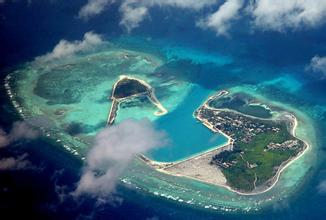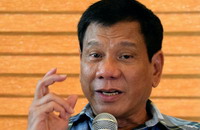In the global political landscape looms a superpower with a military and economic might widely believed to remain unrivalled at least for decades to come.
Yet it appears that in recent years the hegemon -- the United States, or specifically its national security apparatus -- has grown increasingly restless. It sees the irrevocable collective rise of the developing world as a threat and refuses to accept what is natural and inevitable. That bodes trouble for all.
The peerless prowess that underpins the United States' leading role on the world stage stems from a combination of political, economic, geographical and other factors, including a grand vision that allowed it to work with others to establish the current international system.
Yet that strategic sobriety has noticeably given way to a sense of superiority. Three decades of unipolar hegemony has induced a historically ill-founded but deeply entrenched belief in Washington that the United States is an exceptional country above all others, and international affairs should be managed in either the American way or no way at all. Its past success in nipping every serious challenger to its dominance in the bud has only deepened its complacency.
But now with the unstoppable growth and ascent of developing countries, it appears destined that the U.S.-led West will have to share the stage with "the rest." Although the nascent shift is merely a logical outcome of history and does not cost Washington any of its legitimate interests, a self-inflicted anxiety is taking hold of what is called the national security state of America.
Hawkish decision-makers and opinion leaders are drowning out reason and morality in the United States and fanning the fear that America is losing what it is entitled to. Upholding the banner of "America First," the current U.S. government has in a little more than two years shown the world how far it is willing to go in order to "make America great again," although the United States remains the sole superpower in today's world.
Global trade is so far a major battlefront. In the eyes of incumbent U.S. policy-makers, the laws of economics and trade are nothing but a hoax, and any country that has a trade surplus with the United States is ripping it off.
They have waged waves of tariff offensives against not only China, but also U.S. allies like the European Union, Japan, South Korea and Canada, slapping heavy levies on imported products ranging from steel and auto parts to toys and bikes, regardless of rising financial burdens on domestic consumers and businesses, and the rules of the World Trade Organization (WTO).
Washington's assault on the rules-based multilateral global trading system is posing a serious threat to future global economic growth. Gita Gopinath, the International Monetary Fund's chief economist, warned in May that "the latest (tariff) escalation could significantly dent business and financial market sentiment, disrupt global supply chains and jeopardize the projected recovery in global growth in 2019."
The high-tech realm has also witnessed the United States scrambling to secure its supremacy. However, it is trying to do so not by sharpening its own edges in fair competition, but by employing the state power to drive out competitors.
Its unjustified crackdown on telecom equipment provider Huawei and other Chinese high-tech companies under the excuse of national security is reminiscent of its erstwhile plot against Japan's once booming semiconductor industry, and widely interpreted as an attempt to sabotage China's standard-setting capabilities in such key areas as the next generation of mobile communications and ensure China's permanent inferiority, at least in advanced technology.
In the realm of geopolitics, Washington's hegemonic anxiety disorder has become even more conspicuous, especially in its policies on the Middle East and Latin America. In recent months, the United States has flirted with going to war against Iran and orchestrating a coup d'etat in Venezuela.
Meanwhile, the current US government is seeking to reap the benefits of being what Martin Wolf, chief economics commentator at the Financial Times, called a "rogue superpower" while refusing to bear its due global responsibility. Its withdrawal from the Paris climate accord and the Iran nuclear deal has breached the global efforts to address many of the world's most pressing challenges.
In the post-Cold War era, the West once believed that the world had entered a period of "Pax Americana," where the United States would act as a builder of a rules-based international order and a guardian of peace. However, three decades later, Western countries are disappointed to discover that it has become a big bully pushing the world toward "Chaos Americana."
Given the high stakes, the international community, including the sober minds in America, needs to work together to help Washington make peace with the current historical trend. After all, every nation is part of the planet, every people is entitled to pursue happiness, and every country has the right to developing its economy and technology.
As for Washington, it should, as US political scientist Joseph Nye has suggested, learn the importance of using its power with others, not just over others, in today's increasingly interdependent world.
Source link
Hegemonic practices of US will finally lead to failure
There's a proverb in the western world that self-knowledge is the most valuable knowledge. However, some US politicians, who are just not able to have a clear knowledge of themselves and the global situation, are still stubbornly following the outdated hegemonic approach.
With the strategy of "America first", these US politicians have never cared about the interests of other countries or the common welfare of global citizens.
They started the trade war under the excuse that the US is losing in its trade with China, but keep silent about the huge profits they have gained from the relationship. They make frequent statements that other countries have posed threat on US national security, but turn mute on their globally-reaching intelligence network. They strongly criticize international organizations such as the WTO, but make no mention of the fact that the US is a major founder and the largest beneficiary of the current global governance system.
White House National Trade Council Director Peter Navarro even said bluntly that other countries dare not to take retaliatory measures against the US because of the great power of the latter. Such arrogance revealed what truly lies under the slogan of "Make America great again".
The bullying and arbitrary practices of the US are supported by the hegemonic logic of the country that US rules apply to the whole world and other countries must compromise to ensure US interests.
From the "economic aggression" theory by US Vice President Mike Pence, to the fallacy made by Navarro that Chinese commodities are mortgaging America's future, and to the statement of former White House Chief Strategist Stephen Bannon that exporting of Chinese excess capacity gutted the upper Midwest of the United States, these US politicians take normal economic exchanges as "nails" and wish to hammer them. They are not willing to see the Chinese people live in a well-off society just like Americans do.
Under the banner of "America first", some US politicians just cannot keep a lid on their impulses and even started attacking their allies. Not long ago, Chancellor of Germany Angela Merkel expressed her views on the cracking foundation of the post-World War II order and the deterioration of trans-Atlantic ties. The US is becoming a rival of global countries.
Why the US politicians are still dreaming about the "chosen nation" and "shining city upon a hill"? It's because they still believe in the old philosophy that might is right, and perceives the world with a "law-of-the-jungle" mentality. Besides, they are taking international relations as a "clash of civilizations".
This explains why the US government always calls itself a monitor of global orders and a judge of international relations.
With the irreversible trend of today's multi-polarization, economic globalization, cultural diversification and social informatization, the US is still considering itself a savior of the world and taking the globe as its "backyard garden" where it can act arbitrarily and do everything it wants to. It is even making attempts to stop the building of a community with a shared future with the so-called "America first" policy.
At present, the US hegemony has aroused anger from across the world. Even some US enterprises are making adjustments in reaction to the pressure from the US government. A series of "made-in-America" companies including Harley-Davidson, Inc., have "escaped" from the US, and Exxon Mobil Corporation and Tesla are also building factories in China.
However, the US hegemony is nothing but a wishful thinking. According to American scholar Stephen Roach, the US had merchandise trade deficits with 102 countries in 2018, which reflected the extreme insufficiency of the country's domestic savings - a situation caused by the rash approvals of budget deficit made by the congress and decision makers.
Some scholars attributed the inequality in the US to its wrong policies, rather than economic globalization. Unfortunately, some US politicians made wrong prescriptions, and called other countries a barrier on the way to "make America great again".
Blaming the others for its own mistakes, the US will miss the opportunity for self-improvement and hurt the country and people via the diversion of domestic contradictions.
US scholar Robert Kagan argues that America's decline is being actively willed by unnamed "politicians and policymakers", and they are "in danger of committing pre-emptive superpower suicide out of a misplaced fear of declining power".
No country in the world is willing to be manipulated by other countries in human history. Mutual respect, sincere cooperation and win-win benefits should be the principle held by each country when it comes to international relations.
Of course, it's not easy for the arrogant US politicians to be aware of this. The bright side is that facts don't lie and speak louder than words.
There is an idiom in China that ultimate power incurs humiliation. Any country that deviates from the path of win-win cooperation and sticks to zero-sum games, disobeys rules for fair competition and pressures others, and goes against the trend of economic globalization and resorts to conservatism will end up losing.
Hegemony will only consume the power of a nation and accelerate the process of its recession. Such cases are just prevalent in history.
Read more:
Summit could signal end to Pax-Americana: expert
Chinese President Xi Jinping will hold multilateral
meetings with leaders of BRICS countries, trilateral talks with leaders
of India and Russia as well as meetings with leaders of African
countries during the G20 summit in Japan from Thursday to Saturday,
Chinese officials said
China is ready to work with relevant sides to firmly
uphold multilateralism, and oppose unilateralism and protectionism at
the upcoming Group of Twenty (G20) summit in Osaka, Japan, said senior
officials in Beijing Monday.
Amid an impasse between the US and China, the G20 summit
in Japan offers a platform where US President Donald Trump will be able
to talk with Chinese President Xi Jinping, if all goes well. It is too
early to predict the outcome, but the summit has rekindled hopes that
the two sides may resume trade talks after negotiations to reach a broad
deal left hanging last month.
Amid an impasse between the US and China, the G20 summit
in Japan offers a platform where US President Donald Trump will be able
to talk with Chinese President Xi Jinping, if all goes well. It is too
early to predict the outcome, but the summit has rekindled hopes that
the two sides may resume trade talks after negotiations to reach a broad
deal left hanging last month.
The US has increased trade conflict with China, and also
Europe. What was the primary reason for Washington to start the trade
dispute with them? Will China and Europe further expand cooperation to
deal with US unilateral and protectionist behavior?
Having a secretary of state of this caliber is a tragedy
of US politics and the sorrow of international politics. The world needs
to be exposed to the damage Pompeo has brought to humankind's peaceful
existence.
American people will feel the pain if the world is deprived of China's huge market.
Related posts:
The Sino-US trade dispute is not only
a game between representatives of the two countries at the negotiating
table, but also a cont...































